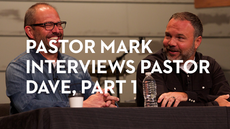For some days he was with the disciples at Damascus. 20 And immediately he proclaimed Jesus in the synagogues, saying, “He is the Son of God.” 21 And all who heard him were amazed and said, “Is not this the man who made havoc in Jerusalem of those who called upon this name? And has he not come here for this purpose, to bring them bound before the chief priests?” 22 But Saul increased all the more in strength, and confounded the Jews who lived in Damascus by proving that Jesus was the Christ.
23 When many days had passed, the Jews plotted to kill him, 24 but their plot became known to Saul. They were watching the gates day and night in order to kill him, 25 but his disciples took him by night and let him down through an opening in the wall, lowering him in a basket.
26 And when he had come to Jerusalem, he attempted to join the disciples. And they were all afraid of him, for they did not believe that he was a disciple. 27 But Barnabas took him and brought him to the apostles and declared to them how on the road he had seen the Lord, who spoke to him, and how at Damascus he had preached boldly in the name of Jesus. 28 So he went in and out among them at Jerusalem, preaching boldly in the name of the Lord. 29 And he spoke and disputed against the Hellenists. But they were seeking to kill him. 30 And when the brothers learned this, they brought him down to Caesarea and sent him off to Tarsus.
31 So the church throughout all Judea and Galilee and Samaria had peace and was being built up. And walking in the fear of the Lord and in the comfort of the Holy Spirit, it multiplied.
Saul lived uncomfortably in the middle. He was reluctantly accepted by the church—twice (Acts 9:13–14, 26). And his preaching ministry placed him on the Jews’ and Greeks’ most-wanted list (Acts 9:23, 29). This week’s passage gives us a look into the life of Saul and how he lived life between these polarizing groups.
Saul was caught in a chaotic cycle of rinse and repeat. Soon after regaining his sight and strength (Acts 9:18–19), he began proclaiming the gospel in synagogues (Acts 9:20). Many, including the synagogue, were less than impressed—they plotted to kill him (Acts 9:23–24). From here, Saul escaped the city, traveled to Jerusalem, and went through the experience yet again.
Many will have experiences similar to Saul’s when coming to faith in Jesus. People you used to associate with may no longer accept you and you may find it difficult finding community within the church. Thankfully our relationship with God is not based on the faithfulness of others toward us but rather Jesus’ faithfulness toward us. Remarks the author of Hebrews,
“Therefore, since we are surrounded by so great a cloud of witnesses, let us also lay aside every weight, and sin which clings so closely, and let us run with endurance the race that is set before us, looking to Jesus, the founder and perfecter of our faith, who for the joy that was set before him endured the cross, despising the shame, and is seated at the right hand of the throne of God.” Hebrews 12:1–2
Questions
- Can you relate to Saul’s (Paul) experience of living uncomfortably in the middle?
- What was your experience like when you devoted your life to Jesus? How did your family and friends respond to your decision? Did you have an easy or difficult time finding community in church?
- Paul and countless others throughout history provide encouraging examples of a life lived wholeheartedly for Jesus. How can we find encouragement from Paul’s example of faith?
This devotion is adapted from the Acts Study Guide: Chapter 6–11. Pick up a copy today for only $9.99. The Study Guide includes an 11-week curriculum with small group studies, group inductive studies, as well as 55 daily devotions for your personal or family worship.















